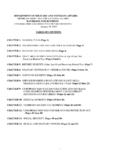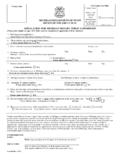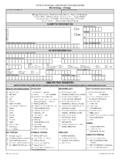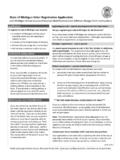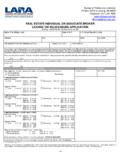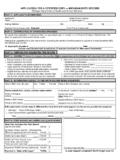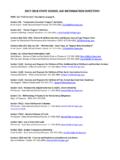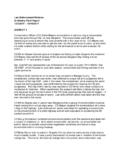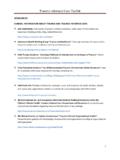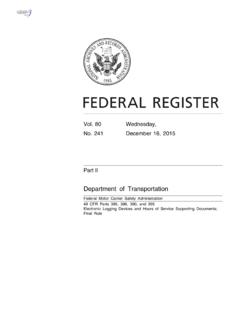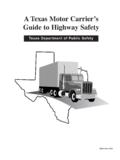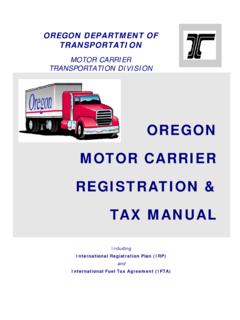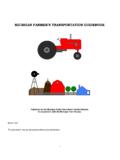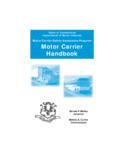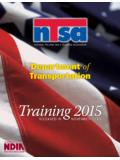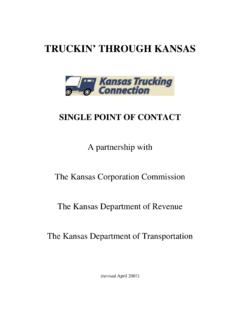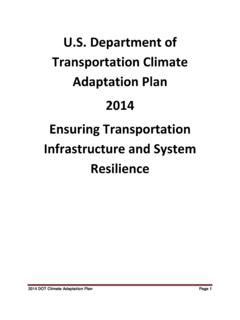Transcription of MICHIGAN PASSENGER TRANSPORTATION GUIDEBOOK
1 MICHIGAN PASSENGER TRANSPORTATION GUIDEBOOK MICHIGAN PASSENGER TRANSPORTATION GUIDEBOOK Published by the MICHIGAN State Police Traffic safety Division August 2007 This document may be reproduced without permission MICHIGAN PASSENGER TRANSPORTATION GUIDEBOOK 1 This publication is based on MICHIGAN state statutes, including the MICHIGAN adoption of the federal motor Vehicle safety Regulations (FMCSR). State statutes referenced in this document include: The MICHIGAN Limousine TRANSPORTATION Act (Act 271 of 1990, as amended); The MICHIGAN motor Bus TRANSPORTATION Act (Act 432 of 1982, as amended); The MICHIGAN motor Carrier safety Act; (Act 181 of 1963, as amended); and The MICHIGAN Vehicle Code (Act 300 of 1949, as amended). All MICHIGAN statutes can be viewed, printed, and saved at Some counties, cities or townships may have additional laws regarding PASSENGER TRANSPORTATION .
2 Both Act 181 and Act 432 adopt by reference the federal motor Carrier safety Regulations (FMCSR), which are promulgated by the Department of TRANSPORTATION , federal motor Carrier safety Administration (USDOT/FMCSA), so that the FMCSRs are state statute. This publication is for educational purposes only and does not attempt to substitute for or directly quote the laws referenced herein. Although it is intended to keep this document current, the regulations are constantly being revised, so readers are cautioned to consult the actual regulations for compliance. This document does not address all of the regulations, but does discuss those regulations that seem to generate the most questions and concern. This document may be reproduced without prior permission. SOURCES OF INFORMATION The Great Lakes Limousine Association: 810-523-3221 or The MICHIGAN Trucking Association: 517-321-1951 or of federal regulations, forms and documents, etc.
3 The MICHIGAN Center for Truck safety : 800-682-4682 or Drivers GUIDEBOOK , Questions answered, Training, etc. The MICHIGAN State Police Traffic safety Division: Contact your local state police post or The MICHIGAN Department of TRANSPORTATION motor Bus & Limousine Regulatory Unit: 517-335-2574 or ,1607,7-151-9625_21607_21616---, Department of TRANSPORTATION , federal motor Carrier safety Administration: 202-366-1790 or USDOT/FMCSA/ MICHIGAN Division Office 517-853-5990 FMCSA Violation Hotline 888-368-7238 safety Ratings/USDOT Numbers/New Entrants 800-832-5660 or MICHIGAN PASSENGER TRANSPORTATION GUIDEBOOK 2 WHAT REGULATIONS APPLY TO ME? The PASSENGER TRANSPORTATION regulations in MICHIGAN are fairly complex. There are two essential questions that must be answered to determine which statutes apply to your operation: What is the PASSENGER capacity of the vehicles I am utilizing?
4 Do I transport passengers for-hire? PASSENGER Capacity Generally, the manufacturer or the secondary manufacturer ( , companies that stretch limos) are required by federal regulations established by the Department of TRANSPORTATION , National Highway Traffic safety Administration (USDOT/NHTSA), to affix a label indicating the maximum number of passengers, including the driver, for each vehicle. In the absence of such a label, some agencies will utilize a 14 wide template to count the number of seats available for use in a vehicle. The template size is based on USDOT/NHTSA standards. It is important to note that some statutory definitions are based strictly on PASSENGER design capacity, and some state designed or used, meaning that if an eight PASSENGER vehicle is used to transport 12 people, it falls within that definition of that particular act. In addition, some definitions also have a gross vehicle weight or gross vehicle weight rating threshold.
5 In this circumstance, a vehicle can be under the PASSENGER design capacity for the act, but over the weight threshold, and therefore subject to the act. For-Hire or For-Compensation For-hire, also referred to as for compensation, are operations where a person must pay for the TRANSPORTATION being provided. There are two types: Direct Compensation: the person pays specifically for the TRANSPORTATION being provided. Indirect Compensation: the person pays for an entire package, in which TRANSPORTATION services are included ( , airport shuttles, rental car shuttles, canoe rentals, etc.). The following table breaks out the various regulations and how they apply to individual operations: Number of Passengers* For Hire or Private Applicable Act(s) Under 9 For-Hire, Direct Act 271 9-15 For-Hire, Direct Act 271 Act 181/FMCSR 9-15 For-Hire, Indirect Act 181/FMCSR Over 15 For-Hire, Direct Act 432/FMCSR Over 15 For-Hire, Indirect Act 181/FMCSR Over 15 Private, Not For-Hire Act 181/FMCSR *For purposes of this document, the number of passengers always includes the driver.
6 MICHIGAN PASSENGER TRANSPORTATION GUIDEBOOK 3 MICHIGAN Limousine TRANSPORTATION Act (Act 271 of 1990, as amended) Note: all PASSENGER capacities noted include the driver. Certificate of Authority and Annual Inspection Act 271 of 1990 requires for-hire limousine operations to obtain a certificate of authority from the MICHIGAN Department of TRANSPORTATION (MDOT) prior to beginning operations (Section and 1911). The certificate must be renewed annually (Section ). MDOT issues annual decals to limo carriers and requires a decal to be affixed to each limousine. There is an application fee and an annual renewal fee. In addition, limo carriers must have each limo annually inspected by a state certified mechanic. Any limo that fails inspection cannot be utilized (Section ). Insurance For limousines with a seating capacity of 1 to 9 passengers, the owner must have bodily injury and property damage liability insurance with a minimum combined single limit of $1 million for all persons injured or for property damage.
7 For limousines with a seating capacity of 10 to 15 passengers, the owner must have bodily injury and property damage liability insurance with a minimum combined single limit of $2 million for all persons injured or for property damage. A limo carrier must also maintain personal protection insurance and property protection insurance as required by the state insurance code (Act 218 of 1956). Exemptions The following operations are exempt from Act 271 (Section ): Public Transit Buses that remain in the political subdivision that grants them authority Transporting passengers for funerals Limos operating within the boundaries of a local government that has its own safety inspection and insurance requirements Metered taxi cabs of 3-9 PASSENGER capacity Additional Statutes The MICHIGAN Vehicle Code (Act 300 of 1949) has additional requirements for limo carriers: Section (6) requires a limo carrier to subscribe to the commercial look-up service maintained by the Secretary of State (driver license records of limo drivers).
8 Section (7) requires a limo driver to maintain the most current copy of all nonpersonal information related to his/her driving record in the limousine and keep it available for review by any prospective PASSENGER . Section (8) states that any prospective PASSENGER may review a copy of all nonpersonal information related to the driving record of a limo driver. Section (4) allows passengers of a chartered vehicle authorized to operate by MDOT to possess open intoxicants. See the discussion of the MICHIGAN motor Carrier safety Act, Act 181 of 1963 in this document for additional regulations that pertain to for-hire operations utilizing vehicles of 9-15 passengers. MICHIGAN PASSENGER TRANSPORTATION GUIDEBOOK 4 MICHIGAN motor Bus TRANSPORTATION Act (Act 432 of 1982, as amended) Note: all PASSENGER capacities noted include the driver. School Bus Operations For-hire companies that provide school bus TRANSPORTATION for public and private schools must comply with Act 432.
9 Public schools that provide for-hire TRANSPORTATION to groups other than pupil TRANSPORTATION to and from school are subject to this Act. Private schools that provide their own TRANSPORTATION are not subject to this Act, but are subject to Act 181 of 1963. All school buses are subject to the MICHIGAN Pupil TRANSPORTATION Act, Act 187 of 1990, which is not addressed in this document. Certificate of Authority and Annual Inspection Act 432 of 1982 requires for-hire motor carriers of passengers to obtain a certificate of authority from the MICHIGAN Department of TRANSPORTATION (MDOT) prior to beginning operations (Section and 107). The certificate must be renewed annually (Section ). There is an application fee and an annual renewal fee. In addition, for-hire motor carriers of passengers must have each motorcoach annually inspected by an MDOT inspector (Section ). Any bus that fails inspection cannot be utilized (Section ).
10 Insurance A motor carrier of passengers must have bodily injury and property damage liability insurance with a minimum combined single limit of $5 million for all persons injured or for property damage for each bus (Section ). A motor carrier of passengers must also maintain personal protection insurance and property protection insurance as required by the state insurance code (Act 218 of 1956). An exemption is provided for motor carriers of passengers that submit a certificate of self-insurance from the MICHIGAN Secretary of State. Exemptions The following operations are exempt from Act 432 (Section ): Public Transit Buses that remain in the political subdivision that grants them authority Decals MDOT Rule promulgated under Act 432 requires that annual registration decals be issued and affixed to each motor bus and placed on the left side of the motor bus in the area immediately under the driver s window. Carrier Identification requires each bus with an MDOT certificate of authority to be marked with the name of the owner and the operator of the bus on the left side of the unit.
